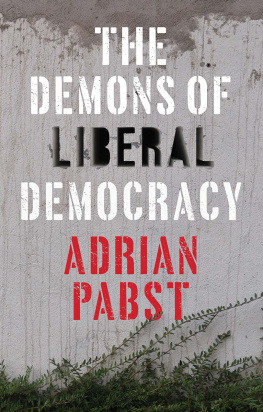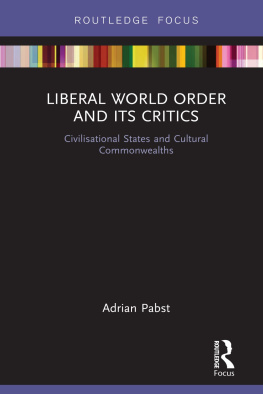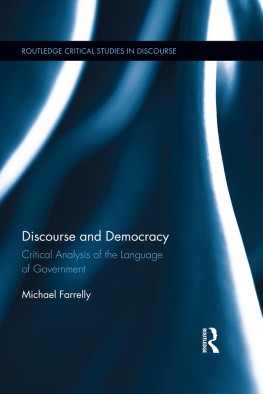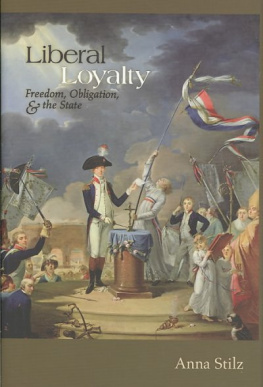CONTENTS
Guide
Pages

The Demons of Liberal Democracy
Adrian Pabst
polity
Copyright Adrian Pabst 2019
The right of Adrian Pabst to be identified as Author of this Work has been asserted in accordance with the UK Copyright, Designs and Patents Act 1988.
First published in 2019 by Polity Press
Polity Press
65 Bridge Street
Cambridge CB2 1UR, UK
Polity Press
101 Station Landing
Suite 300
Medford, MA 02155, USA
All rights reserved. Except for the quotation of short passages for the purpose of criticism and review, no part of this publication may be reproduced, stored in a retrieval system or transmitted, in any form or by any means, electronic, mechanical, photocopying, recording or otherwise, without the prior permission of the publisher.
ISBN-13: 978-1-5095-2848-6
A catalogue record for this book is available from the British Library.
The publisher has used its best endeavours to ensure that the URLs for external websites referred to in this book are correct and active at the time of going to press. However, the publisher has no responsibility for the websites and can make no guarantee that a site will remain live or that the content is or will remain appropriate.
Every effort has been made to trace all copyright holders, but if any have been overlooked the publisher will be pleased to include any necessary credits in any subsequent reprint or edition.
For further information on Polity, visit our website: politybooks.com
Acknowledgements
I was encouraged to write this book by George Owers, and I owe him and his colleagues a debt of gratitude for publishing it with Polity Press. The manuscript was mostly written during my research sabbatical in the academic year 201718, and I am grateful to the University of Kent for the opportunity.
My colleagues in the School of Politics and International Relations have been very supportive in my years at Kent, especially Iain MacKenzie, Luca Mavelli, Sen Molloy, Stefan Rossbach, Richard Sakwa, Harmonie Toros and Richard Whitman, as well as Diane Arthurs and Siobhan Dumphy. I have learned much from the students who took my modules Market-States and Post-Democracy and Resistance and Alternative to Capitalism, as well as my PhD students Zachary Paikin, Andrew Morris and Paolo Santori.
Earlier versions of some of the chapters were presented at various conferences and workshops. is an extensively revised and expanded version.
is based on my paper given at a workshop on 7 November 2017 on Democracy and Human Dignity, hosted jointly by the Las Casas Institute in the University of Oxford, St Marys University Twickenham and Theos think-tank. I would like to thank the organisers and participants for their comments and suggestions that have helped me to develop my thinking.
My intellectual debts are too numerous to mention, but I would like to acknowledge conversations over many years with close friends and colleagues, including Richard Beardsworth, Russell Berman, Luigino Bruni, Christopher Coker, Jon Cruddas MP, Maurice Glasman, Tim Luke, John Milbank, James Noyes, Marcia Pally, David Pan, the late Nicholas Rengger, Jonathan Rutherford, Roberto Scazzieri, Larry Siedentop, and Stefano and Vera Zamagni.
In recent times, I have benefited much from conversations with Michael Casey, Jason Cowley, Paul Embery, Damien Freeman, Brian Griffith, Jack Hutchison, Ron Ivy, Jim McMahon MP, Morgan McSweeney, Shabana Mahmood MP, Lisa Nandy MP, Jesse Norman MP, Julien OConnell, Hannah ORourke, Steve Reed MP, Rachel Reeves MP, Barbara Ridpath, David Rouch, Michael Sandel, Roger Scruton, Matthew Sowemimo, Liam Stokes and Florence Sutcliffe-Braithwaite.
My greatest debt is to my parents, Reinhart and Brigitte, and it is to them that I dedicate this book.
Introduction Liberal Democracy in Question
A new narrative is taking hold among the Wests ruling elites in politics and the media. The argument is that Western liberal democracies face an existential threat from foreign autocracies and dictatorships, most of all Moscows propagandist cyber-campaign and electoral interference as part of the Kremlins hybrid war. Key to this is the claim that social media manipulation swung the result of narrow votes in favour of Brexit and Donald Trump. This seems to be illustrated by Cambridge Analytica, which allegedly bought access to personal data on Facebook in order to micro-target swing voters and those it might have considered to be easily persuadable people. Unable to comprehend the political insurgency that is sweeping through the West, many politicians and pundits appear to believe that millions of their fellow citizens voted against the ruling establishment because Russian bots and data-powered political ads manipulated them. This narrative forgets that our age of anger has its origins in the moral bankruptcy afflicting Western capitalism and the failure of liberal democratic systems to deal with the popular backlash against rapid cultural change. Elites left, right and centre are struggling to grasp why a popular majority rejects the status quo.
Many of those who consider the upheaval shaking Western liberal democracies as fundamentally homegrown tend to view it in primarily economic terms. Once confined to the political fringe, far-left and radical-right insurgents are apparently in the ascendancy because of mounting rage against an establishment that has failed to address the main economic problems, including financial disruption, exorbitant executive pay, youth unemployment and growing regional inequalities. Emblematic of this is all the talk about those left behind by globalisation and about the retreat of liberalism. 2016 was the year when the ghosts of capitalism came back to haunt the elites. For the first time since the Great Depression and the post-war settlement, Brexit and Trump gave the economic losers a political victory over the winners. The popular revolt against the establishment is only beginning, but it has already buried once and for all the idea that Western liberal democracy ushered in the end of history the conceit that the Wests brand of democratic capitalism is the only valid model because it combines political freedom with economic opportunity and social cohesion.
However, it was not just their marginalisation in the economy that voters resented. The fact that they voted against their economic self-interest suggests that their revulsion was to do with the denigration of their values and identities by the members of the professional political class. Hillary Clintons dismissal of half of Trump voters many former Democrat supporters as a basket of deplorables exemplifies the contempt in which liberal elites hold those for whom global free trade, mass immigration and the priority of minority values over declining majorities and their ways of life mean greater economic hardship and unnerving cultural compromises. The elites used to say its the economy, stupid, but now cultural loss appears to trump economic pain.
Liberal democracy is in question because, so far, it has not coped with the economic injustice and divisions in society that threaten the social contract between the people and their representatives. The depth of divisions has been laid bare in recent referendums and elections, as countries are split between young and old, between the metropolis and the provinces, between cities, small towns and the countryside, and between those who are university educated and those who are not. These divisions can be mapped on to the electoral divide of Remain/Brexit, Clinton/Trump and Macron/Le Pen. The old opposition of left/right seems increasingly obsolete, its dominance in contemporary politics superseded by a new narrative of a clash between liberal-cosmopolitan people from nowhere and conservative-communitarian people from somewhere.








